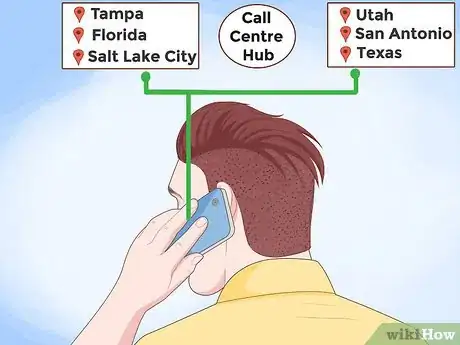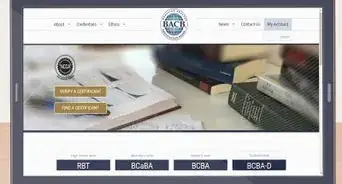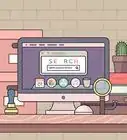This article was co-authored by Kolby Goodman. Kolby Goodman is a Career & Job Search Coach and the Founder of The Job Huntr. With over eight years of experience, he specializes in resume edits, interview preparation, LinkedIn profile feedback, and professional interview coaching. Additionally, his career advice has been featured in publications such as The Huffington Post. Kolby holds a Bachelor’s degree in Economics from San Diego State University.
wikiHow marks an article as reader-approved once it receives enough positive feedback. In this case, 100% of readers who voted found the article helpful, earning it our reader-approved status.
This article has been viewed 150,659 times.
In the modern job market, call centers are a significant employer. The work often does not require specific prior experience or education, but there are some basic people skills that are necessary, or at least helpful, if you want to be a successful call center agent. You’ll get a call center job more easily if you practice being calm and patient, learn the phonetic alphabet to aid communication, and get really good at multitasking. To help secure the job, you can write a great cover letter highlighting your best attributes, practice for the interview and learn about the company. You’ll still have to search the job boards and send applications, but you can get yourself ready to look like a great candidate in the meantime.
Steps
Polishing Your Skills
-
1Practice patience. One of the stressful aspects of call center work is that people you talk with often do not want to be on the phone with you. If they are calling because they have a problem, they want it resolved quickly. If you call them, they may feel intruded upon. So to prepare for call center work, you must learn to be exceptionally patient even with the most difficult people. If you are prone to hurrying people along or interrupting, you will need to reduce these tendencies quickly.[1]
- In your daily conversations, make a specific effort to never interrupt people. Always let them completely finish what they are saying, even if they take way too long.
- When you are having a misunderstanding with someone and you start to get agitated, take deep breaths and remind yourself to stay calm.
- Having a great deal of patience will allow customers the time they need to explain their concerns and help you actively assist them along the way.
-
2Learn the phonetic alphabet. This is the ABC’s code designed by NATO, also known as Alpha Bravo Charlie code, and it designates a word for each of the 26 letters of the alphabet. When taking calls you will often be speaking to people with varied accents. You’ll also have some calls where the connection has static which makes it hard to hear. Using the phonetic alphabet will help ensure that anytime you are unsure of what you heard you can double check.[2]
- Since memorization skills are so helpful anyway, this is a good place to start.
- There is a fairly standard phonetic alphabet, but there are variations, so learn both if possible. An internet search for “phonetic alphabet” will return a simple graph listing all of the code letters.
- For example, if someone is speaking and spells their name to you “B-e-t-t-y,” you may be unclear if they said B or P, since they have similar sounds. So you can ask, “Is that B as in Bravo?” which helps clear things up.
Advertisement -
3Be proficient at multitasking. Call center jobs are usually tech-driven and involve speaking to the caller while also working on the computer. Besides physically doing more than one thing, your mind needs to be sharp at thinking through multiple processes at once. As the person tells you their problem or asks for information, you need to be figuring out what to tell them and finding the information on your computer. [3]
- Start building your capacity of doing and thinking more than one thing at a time. Try listening to someone talk, perhaps through headphones listening to a podcast, while also searching the internet for something completely different. You must be taking in the information through both listening and reading your screen.
- Having a tidy workspace, being organized when note-taking, developing great time management, and prioritizing will help you manage your daily workload and multitask.
-
4Be available. Call centers tend to operate on a 24 hours a day, 7 days a week, 365 days a year basis, so that means you may be asked to work nights, weekends, and even holidays depending on the company. Because of this, your non-work schedule needs to be flexible enough to account for the hours you may have to work. When applying and interviewing, you don’t want to lie about the schedule you can manage, but you want to be as flexible as possible about when you are willing to work.[4]
- Someone who says they are only willing to work a regular 9-5 shift may be less likely to be hired than someone who is willing to work nights. Make an honest assessment of your willingness and ability to work the types of hours you may be asked to work. If you know you can’t be awake during night time, don’t say you are able to.
Making a Great Impression
-
1Search for call center jobs. Almost any company that has a customer service number could potentially have a call center where their agents operate. Phone companies like AT&T and Verizon use call centers, for example. If you had a company like this in mind that you were interested in you can check job listings on their site. Otherwise, you can look at job board sites like Indeed or Monster which will give you many options. Another good option is Callcenterjobs.com which has listings by location and job category. Many companies even offer work-from-home opportunities so you would not be required to commute anywhere to get to work.
- Tampa, Florida, Salt Lake City, Utah, and San Antonio, Texas are a few cities that have a high number of call center employees. But most states have at least a few call centers.
-
2Write a cover letter outlining your skills. Since call center jobs are very people oriented and require strong communication skills, a cover letter is a great way to make a positive first impression. Since call centers may not require you to have experience specifically in a call center, it is good to highlight the skills and experiences you do have that make you a good fit. Point out the skills you have been polishing such as patience, efficiency in fulfilling multiple tasks at once, and solving problems quickly.[5]
- Cover letters are all about selling yourself as the best candidate for the job, so don’t be afraid to talk yourself up, while being honest. Think of the jobs you have held so far and highlight the skills from those that would translate well to the call center model.
- You can also mention specific skills you have working with computers or any experience that involved customer service or customer relations.
- Make sure to look over the cover letter a few times to make it straightforward and informative, and edit it thoroughly to make sure there are no errors. You can even have a friend check it over to see if you missed anything.
- Try your best to translate your customer service skills, your communication skills, and your problem solving skills into some kind of clean metric, as that is going to help the hiring manager not only understand what you're capable of having those skills, but how those skills actually translate to good numbers for the company.
-
3Practice for the interview. In general, interviews may be over the phone or in person, and given the phone aspect of call centers, a phone interview may be likely. Know the information from your cover letter well so you can refer to it when asked about yourself. The most important aspect will be communicating well. Be sure to practice speaking very clearly so the interviewer will be able to understand you. Think of good answers to some common interview questions ahead of time.
- Examples of interview questions might be: “What can you tell me about yourself?” or “What are your weaknesses?” or “What would make you a good call center agent?” You can answer these by saying, “I enjoy meeting new people and typically find it easy to talk with strangers. I am a little weak in the area of learning things quickly, but I am very good at remembering what I’ve learned. I love to talk with people and help them figure out problems they are facing.”
-
4Learn about the company and their products or services. Before you are face to face or on the phone with someone who may decide whether or not to hire you, do some research into the company and what all they do. Sometimes, a criminal may run a call center to defraud others, but it would be difficult to be sure for example, if selling new condominiums, or popular vacations is helping the boss steal from the customers, but most often you wouldn't be working for someone like that. Having a decent foundation of knowledge about the company you are wanting to work for will set you apart from the many other applicants.[6]
- If they sell products, learn some of the different ones and the specifications. If they run customer service, find out what the customers have purchased. This is also just good knowledge for you to have to understand what types of calls your job would require.
-
5Ask about chances for advancement. One of the benefits that working in a call center offers is that often there is a good opportunity for you to advance beyond the frontlines of phone calls. If you stay with the company long enough and establish a strong track record of high quality and efficient calls, you may be able to earn more and move into positions of authority. When you are interviewing, it can be a great idea to ask what advancement opportunities are available because this will show that you value commitment to the company.[7]
- You will make a stronger case for yourself as a candidate by telling the hiring person that you are interested in being able to stay with the company long-term and work your way up the ranks.
-
6Follow up after applying or interviewing. This kind of job is likely to have lots of applicants and maybe even lots of people who get interviews. To show the company that you are serious about the job, be sure to call after you apply to see if someone received your application. You can also call after the interview and find out if there are next steps you can take. Unless they specifically tell you not to call, they will most likely see this as you being eager and interested in pursuing the job further.
- A couple ways to follow up would be to call the company and say, “I recently put in an application for a customer service job in your call center and I wanted to make sure my application was received.” Or after an interview you can say, “I recently interviewed and I wanted to get some feedback and find out if there are any next steps I can take.”
Expert Q&A
-
QuestionWhat skills do you need to work at a call center?
 Amber Rosenberg, PCCAmber Rosenberg is a Professional Life Coach, Career Coach, and Executive Coach based in the San Francisco Bay Area. As the owner of Pacific Life Coach, she has 20+ years of coaching experience and a background in corporations, tech companies, and nonprofits. Amber trained with the Coaches Training Institute and is a member of the International Coaching Federation (ICF).
Amber Rosenberg, PCCAmber Rosenberg is a Professional Life Coach, Career Coach, and Executive Coach based in the San Francisco Bay Area. As the owner of Pacific Life Coach, she has 20+ years of coaching experience and a background in corporations, tech companies, and nonprofits. Amber trained with the Coaches Training Institute and is a member of the International Coaching Federation (ICF).
Pacific Life Coach You definitely need patience to allow customers the time they need to explain their concerns and actively assist along the way. Empathy is also a great skill to have, since it builds authenticity and positive rapport with customers who may be upset, frustrated or worried. Last, but not least, you will need flexibility and problem-solving skills. Your ability to reason in the moment and act on your own ideas will be enhanced with increased autonomy on the job.
You definitely need patience to allow customers the time they need to explain their concerns and actively assist along the way. Empathy is also a great skill to have, since it builds authenticity and positive rapport with customers who may be upset, frustrated or worried. Last, but not least, you will need flexibility and problem-solving skills. Your ability to reason in the moment and act on your own ideas will be enhanced with increased autonomy on the job. -
QuestionWhat are the requirements for a call center job?
 Community AnswerThis will vary from company to company, but you will often need a diploma or GED. You may be required to have some sales experience, computer skills, strong speaking skills, and availability for varied shifts. Some jobs may require you to know multiple languages, have good math skills, and be able to learn their computer software.
Community AnswerThis will vary from company to company, but you will often need a diploma or GED. You may be required to have some sales experience, computer skills, strong speaking skills, and availability for varied shifts. Some jobs may require you to know multiple languages, have good math skills, and be able to learn their computer software. -
QuestionIf you don't have any grades can they a job if the have skill training?
 Community AnswerCall centers may not require specific grade or for you to already have training. If you do have training already, it will probably help.
Community AnswerCall centers may not require specific grade or for you to already have training. If you do have training already, it will probably help.
References
- ↑ http://www.canadajobs.com/articles/viewarticle.cfm?ArticleID=1221
- ↑ https://www.callcentrehelper.com/phonetic-alphabet-way-improve-customer-service-148532.htm
- ↑ http://www.snagajob.com/resources/call-center-job-skills/
- ↑ http://www.canadajobs.com/articles/viewarticle.cfm?ArticleID=1221
- ↑ http://writing.wisc.edu/Handbook/CoverLetters.html
- ↑ https://www.talkdesk.com/blog/9-top-qualities-of-a-successful-call-center-agent
- ↑ http://csi.softwareadvice.com/reasons-to-consider-call-center-job-0214/
About This Article
If you want to get a job in a call center, look in the newspaper or search online job boards to find open positions. Craft a resume that details your work experience and send it in with your application. For each job you apply to, include a cover letter explaining why you would be a good fit for the job. Some qualities that you might list would include being patient, having good communication skills, or staying calm under pressure, if they apply to you. To learn how knowing the phonetic alphabet could help, keep reading!










-Step-9.webp)























-Step-9.webp)





































